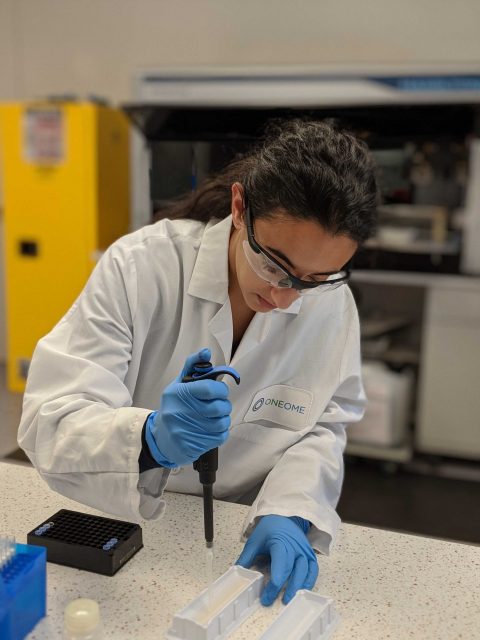Vision and Mission
Imagine a world where medication decisions are optimized to each patient’s genetic profile. It’s a lofty goal but one we are working to achieve every day at OneOme.
A leader in precision medicine co-founded by Mayo Clinic, OneOme is moving the world closer to this vision by enabling healthcare teams with high quality pharmacogenomic (PGx) testing and analytics that help improve outcomes and reduce costs through more personalized medication decisions.

Pharmacogenomics and precision medicine
Pharmacogenomics is a branch of precision medicine that combines the sciences of pharmacology (the study of drugs) and genomics (the study of genes and their functions). At the core, PGx testing analyzes a patient’s DNA and provides genetic information that may help healthcare teams make more personalized medication decisions for them.
The challenge in prescribing
Medication therapies are key to treating many conditions, but not all medications work well for all patients. Research indicates that response rates for many medications are only between 50 and 75%.(1) This variation in response can cause significant expenditures. One study found that the healthcare costs related to non-optimized medications were $528 billion(2) above and beyond the $400 billion spent annually on prescription medications in the US.(3)
Patient outcomes are also at stake. Between 2013 and 2014, adverse drug reactions ADRs precipitated an estimated 4 emergency department visits per 1,000 individuals.(4) A study evaluating 4,802 hospital admissions found that 3.2% experienced ADRs during the hospital stay while 6.2% of admissions were related to an adverse event.(5)
OneOme responds to the challenge
There are a number of factors that can affect the way an individual may respond to a medication, one of which is genetics. More than 90% of people have at least one genetic variant that may affect the way certain medications work for them.(6),(7) These genetic variants can be identified by PGx testing.
Just a Quick Note:
InnovationsOfTheWorld.com has partnered with Trade License Zone (TLZ) to support global innovators looking to expand internationally. Take advantage of the UAE’s Free Zones—enjoy streamlined setup, low corporate taxes, and a strategic gateway to the Middle East and beyond.
Get Your UAE Free Zone License Fast & Easy!OneOme offers the RightMed® Test to help providers optimize prescription decisions based on individual patients’ DNA. This PGx test analyzes a carefully curated, evidence-backed panel of 27 genes that may affect a patient’s response to certain medications used in the treatment of mental health conditions, cancer, pain, and more.
Access to the genetic information contained in the RightMed Test results may help providers reduce medication trial and error and lower the risk of adverse drug reactions. This can lead to lower healthcare costs and improved outcomes. One study found that patients who underwent PGx testing had 40% fewer emergency department visits and 58% fewer hospitalizations compared than those who did not.(8)
The RightMed Test is the core of our offering, which includes secure portals for individual providers and their patients, as well as robust Electronic Health Record (EHR) integration options for hospitals and health systems and population solutions for payers and PBMs.

References
- (1) Spear, BB. Trends Mol. Med. 2001; 7: 201-4.
- (2) IQVIA Institute. (2019). Medicine Use and Spending in the U.S.
- (3) Watanabe, J. H., et al. (2018). Annals of Pharmacotherapy, 52(9), 829–837.
- (4) Shehab, N. et. al., JAMA. 2016; 316(20): 2115-2125.
- (5) Giardina, C. et. al., Front. Pharmacol. 2018; 9: 350.
- (6) Van Driest, SL, et. al., Clin Pharmacol Ther. 2014; 95(4): 423–431.
- (7) Yuan, J. et. al., Jmol Diag. 2016; 18(3): 438-445.
- (8) Perlis et al., 2017; Depression and Anxiety, 35(10), 946–952.














